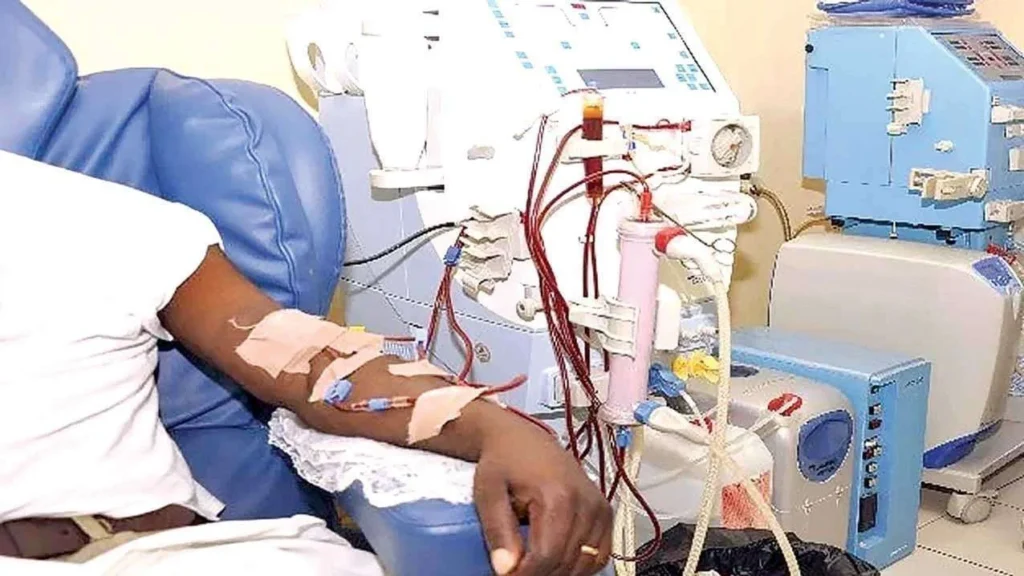Ghana is facing a mounting health crisis as non-communicable diseases (NCDs) continue to claim thousands of lives annually, with recent data from Korle Bu Teaching Hospital painting an alarming picture of the nation’s health burden.
In the first half of 2025 alone, the country’s premier referral facility recorded 5,000 new diabetes referrals and more than 2,000 complicated kidney cases, a sharp reminder of the growing prevalence of chronic illnesses in Ghana.
Renowned Pharmacist and Fellow at the Ghana Centre for Democratic Development (CDD-Ghana), Dr. Kwame Asiedu Sarpong, has described the development as a severe danger that requires urgent action.
According to him, the country is already grappling with high levels of premature deaths, and the growing burden of NCDs could worsen an already grim situation if left unchecked.
“If this continues and if we don’t act quickly, the 40% of deaths between the ages of 40 and 60 years that plagues Ghana will get worse. How with such grim numbers no one asked a question directly relating to health at the presidential press engagement still baffles me.”
Dr. Kwame Asiedu Sarpong
Non-communicable diseases, often linked to lifestyle, environmental, and genetic factors, have emerged as the leading cause of death in many developing countries.

With rapid urbanization, changes in diet, limited physical activity, and increased tobacco and alcohol use, developing nations such as Ghana are experiencing higher rates of diabetes, hypertension, cardiovascular disease, cancer, and chronic respiratory illnesses.
The World Health Organization (WHO) reported that in 2024, NCDs accounted for 45% of all deaths in Ghana. Health experts say the trend is worrying because the country’s health system, particularly at the primary level, lacks the full capacity to diagnose, manage, and treat NCDs effectively.
Despite NCDs becoming common in Ghanaian health facilities, resources such as diagnostic tools, treatment centers, and specialized personnel remain limited.
NCDs Care Neglect
Dr. Sarpong expressed deep concern that despite the seriousness of the issue, NCDs have not received the same urgency in public discourse and policymaking as other health challenges. He stressed that the alarming mortality rates should prompt an immediate and sustained national response.

Globally, NCDs have become a leading cause of mortality, accounting for about 50% of deaths in most African countries. In Ghana, their impact is increasingly evident in the health system’s growing caseload and the burden on families who struggle to afford treatment.
The financial cost of managing chronic conditions, particularly diabetes and kidney disease, has also been devastating for households, many of whom lack adequate insurance coverage.
Government’s Interventions
To address the crisis, Ghana has adopted the WHO Package of Essential Noncommunicable Disease Interventions (PEN), a framework designed to strengthen early detection, prevention, and treatment at the primary health care level.
The PEN framework is expected to support Ghana’s scale-up of essential services to reduce the NCD burden, but experts caution that implementation requires sustained financing and political commitment.
It is against this backdrop that the new National Democratic Congress (NDC) administration, led by President John Dramani Mahama, has introduced what is being described as one of the most ambitious health reforms in the fight against chronic diseases.
The government recently passed the Ghana Medical Trust Fund Act, also known as MahamaCares, establishing a statutory fund dedicated to the treatment and care of individuals suffering from life-threatening NCDs.
The fund is designed as a permanent financing mechanism to reduce the economic burden on families and ensure that patients battling diseases such as cancer, diabetes, chronic kidney failure, cardiovascular disease, and stroke can access quality treatment without facing financial ruin.
Government officials say the initiative represents a recognition that NCDs are no longer just a health concern but also a socio-economic challenge threatening Ghana’s human capital and development goals.
Supporters of the policy argue that MahamaCares will be a game-changer in bridging equity gaps in access to care. For years, patients with NCDs, especially those requiring dialysis or chemotherapy, have struggled with prohibitive costs, forcing many to abandon treatment.
The establishment of a dedicated fund is therefore being hailed as a historic step in aligning Ghana’s health policy with the realities of its disease burden.

However, Dr. Sarpong maintained that financing alone will not be enough if Ghana fails to adopt a multi-pronged strategy. He insisted that tackling NCDs requires preventive action, lifestyle changes, and stronger health promotion.
Public health experts argue that prevention strategies, including nationwide screening programs, improved access to nutritious food, public education on lifestyle risks, and stronger enforcement of tobacco and alcohol regulations, must complement the treatment-focused approach.
Without these, they caution, the burden will continue to rise, putting pressure on the health system and threatening the productivity of the nation’s workforce.
As the government moves to operationalize the Ghana Medical Trust Fund, all concerned Ghanaians expect that the initiative would deliver long-term relief and strengthen the resilience of the health system against the silent epidemic of NCDs.
READ ALSO: Ghana’s Mobile Money Transactions Hit GH¢354.1 Billion






















